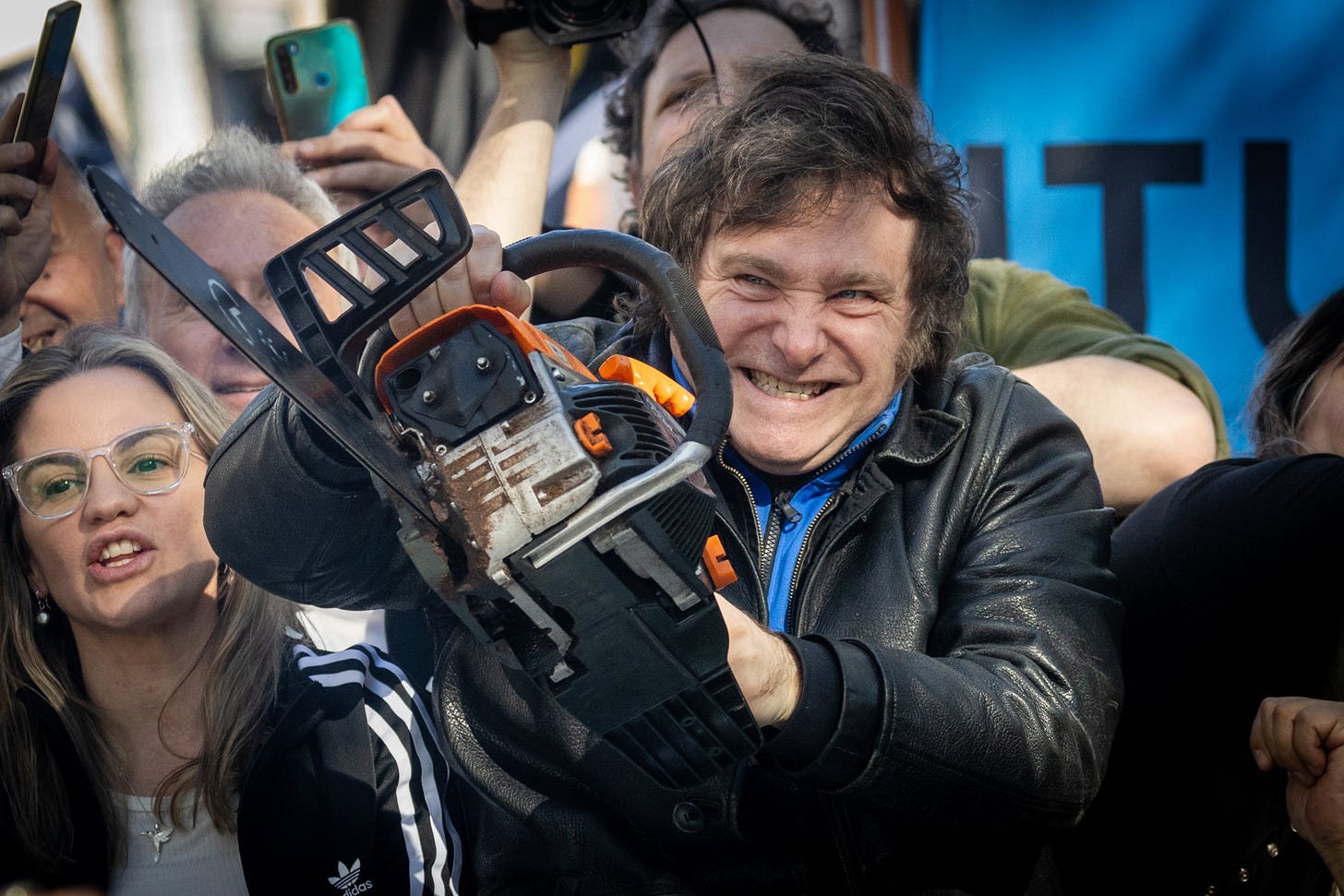The Enigma of Javier Milei
How Argentina’s radically libertarian president-elect fits in with our right-populist moment

There’s nothing especially enigmatic about Javier Milei, Argentina’s self-described “anarcho-capitalist” president-elect. He also calls himself a radical libertarian and has accordingly expressed reverence on numerous occasions for such libertarian luminaries as Friedrich Hayek, Milton Friedman, and Murray Rothbard. (It was Rothbard who coined and developed the concept of “anarcho-capitalism.”) Milei’s convictions in this regard are so passionately held that during his recent campaign for president, he took to pulling the rip cord on a chainsaw at public events to symbolize the anti-government policies he would pursue if he won the presidency, which of course he did a little over a week ago.
What’s enigmatic is how, whether, and to what extent Milei’s electoral victory fits in with the ascent of right-wing populism around the globe over the past decade. There’s something much clearer about the plurality win for the right-populist party of Geert Wilders in last week’s Dutch election. Wilders’ Party for Freedom (PVV) is primarily a vehicle for anti-immigration sentiment, which is usually a core issue for right-populist parties, from Donald Trump’s takeover of the GOP to likeminded movements and politicians holding or aspiring to power across the European continent.
But what to make of Milei?
The confusion arises from the fact that right-populists are often accurately described as “big government conservatives” eager to use state power to advance the interests of the nation. This separates them from the more libertarian-oriented conservatives of the center right that Americans associate with Ronald Reagan and his ideological progeny, who controlled the GOP until 2016. They tended to favor liberal immigration policies, free trade agreements, and muscular internationalism in foreign policy, in addition to tax and spending cuts. But Milei ran for president both as a populist championing the Argentinian people against the country’s political establishment and as a radical libertarian aiming to make drastic cuts to the state, including shuttering Argentina’s central bank.
So which is it? Is Milei a right-populist whose political triumph should be lumped in with those of Trump and Hungary’s Viktor Orbán, as well as the aspirations of the FN in France and AfD in Germany? Or is Milei, instead, a neoliberal poised to reverse the populist turn, giving the libertarian center-right hope for a political revival?
Thinking through the answers to those questions promises to help clarify the meaning of our populist moment.
Two Meanings of Populism
The most important context for Milei’s successful presidential campaign is the history of Peronism in Argentina, and especially its recent economic struggles with hyperinflation.
One way of understanding Peronism (named after its founder Juan Perón) is to see it as an expression of populism that blends elements of the traditional right (nationalism) and left (socialism) into a form of corporatism. Sometimes Peronism has resembled fascism, while at other times it’s moderated to become an almost extra-political ruling ideology that governs by an informal collaborative consensus among leaders of the military, business, and labor sectors of the country. When the military has become disenchanted with the way the Peronist establishment is governing (as it did in 1955 and 1976), it has launched coups to depose it. But once democratic elections have been reintroduced, the Argentine electorate has often reverted to elevating Peronist candidates.
The Argentine economy, meanwhile, has struggled down through the decades, including a brief period of hyperinflation in 1989 and 1990 when prices surged at an annual rate of 2,600 percent. Thanks to economic restructuring overseen by the International Monetary Fund (IMF), the economy stabilized during the 1990s, with inflation over subsequent years usually running in the low double digits through several rounds of sovereign debt restructuring. This started to change around 2015, when annual rates of inflation gradually rose higher, first to around 40 percent, then to the high 50s. By early this year, inflation had broken into triple digits and kept climbing. Last month, on the eve of the presidential election, it hit a post-1990s high of 142.7 percent.
Viewed in this way, Milei’s successful campaign for president can be understood as a populist revolt against the reigning populism of the Peronist establishment. That sounds like a contradiction, but only if we treat populism as an ideology rather than a style of politics.
Keep reading with a 7-day free trial
Subscribe to Notes from the Middleground to keep reading this post and get 7 days of free access to the full post archives.


